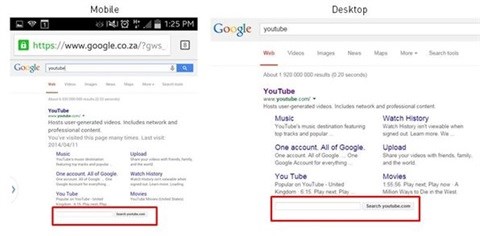
Top stories





Marketing & MediaAds are coming to AI. Does that really have to be such a bad thing?
Ilayaraja Subramanian 1 day

More news















Mobile search
By examining the top five Google search queries (Google Webmaster Tools) belonging to Website A (a website I have analysed over 12 months) in August 2014, I noticed that mobile searches were more specific and time-specific than the equivalent desktop searches. The top five desktop search queries were broad and brand-related. It is important to research and factor in the mobile browsing habits of a target market when compiling content for them on a site.

Apps play a key role in the usage of smartphones and tablets. So, it is imperative for brands' with their own apps to capture this audience effectively. When it comes to users searching for apps on Google Play, Apple's App Store or traditional Google search, it needs to rank well to assist in increasing the number and frequency of its downloads.
In short, the basic SEO principles apply to ASO - on-page optimisation, an exceptional user experience (on-page and app development), social media optimisation and other off-page techniques.
In my opinion, voice searches are usually made through mobile devices because of their on-the-go convenience factor. Voice search queries differ from traditional searches. Voice-derived search queries are often longer than the average traditional search query. In most cases, voice searches appear in the form of questions. This may seem obvious, but a conscious effort needs to be made to accommodate voice search into a mobile SEO strategy.
Images play a large role when it comes to a website's level of user engagement. When perusing Website A's Google image search data for August 2014, the top five image searches relate to specific names of entities which, in turn, relate to those images. It is essential to make sure that a website's images are optimised for search, to maximise a brand's search exposure. This is especially significant if a brand is a visual one, such as a fashion brand.
Embedding online videos into websites is a popular way to engage with users, and rightfully so. Users consume vast quantities of online video on a daily basis and this trend continues to grow. The musician Psy's Gangnam Style music video had been watched 2,095,558,384 (that's 2 billion times plus) on YouTube when I wrote this article.
If a brand makes use of YouTube, then its YouTube channel and videos need to be optimised for traditional searches, YouTube searches and Google video searches. If these videos are embedded into a website, then one needs to optimise the relevant website page as well.
Google has got TV covered. Google can potentially work out what a person is watching on TV by factoring in their location, the time and what's currently on TV. This, in turn, may refine a person's next search results. This system is already part of Google Now.
Desktop organic search traffic is still king when it comes to the 'quality' of visitors, and when it comes to time spent on the website, pages viewed per visit, conversions (such as completing test drive and cell phone contract forms on a website) and the lowest bounce rate. So there should be no doubt that fully utilising this type of website traffic is important to make the most of these 'high quality' visitors. This is where SEO or search engine optimisation comes into play.
A fantastic user experience and exceptional, relevant content (websites with 'thin' content will be penalised further within Google search since the recent release of their Panda 4.1 search algorithm update) are integral components of properly executed SEO, all of which will increase the number of overall website conversions; no matter the source, whether it is from social media, paid search or display ads.
A user can now search a website's content via a search box feature which has a more prominent position within a website's search result listing. This helps remove a step in the search process for users who are looking for content on a large site. It is worth setting it up if it is going to improve users' search experience relating to a website.
Google recommends this feature for vast websites, for example, those that have 1,000 pages or more (my estimate), such as Website A. In order for this functionality to be activated one needs to do the following:
It makes sense that a gigantic website such as YouTube has such a feature:

Google has revealed that it will tweak some of its search result page (SERP) listings by incorporating additional, factual (such as an item's specifications) information. According to Google: "Structured Snippets is a new feature that incorporates facts into individual result snippets in Web Search." Unlike rich snippets (Schema.org), Google does not require extra computer code (markup) to be added to the website for this new feature to work.
Google utilises factual data from useful, relevant tables of data from within website pages. I think that Structured Snippets have a great potential; they could be an exceptional add-on to a car brand website's SERP listings for car models, by including some vehicle specifications. Below is an example of a Structured Snippet:

I touched on the high value of Facebook in my previous article, but I need to emphasise that Facebook can really be a force to be reckoned with if its organic (Facebook Page maintenance) and paid elements are implemented correctly. Facebook was the third-largest provider of visitors to Website A, after direct visits and organic search traffic.
Company A has a well-managed Facebook Page, which generates copious amounts of original and engaging content every day, along with an exceptionally-performing paid campaign ('Like Ads' and Promoted Posts). The reward for these activities was that Company A's Facebook Page provided their website with a large number of 'high quality' visitors (with reference to the same website metrics as organic search's 'high quality' visitors).
It is likely that most brands in South Africa already have Facebook Pages, but these brands should ensure that they are maximising their ROI from them.
A digital agency should apply fresh thinking and innovative practices to digital marketing. Brands should spend the time to set concrete and worthwhile KPI's for each of their digital marketing campaigns and should hold digital agencies fully accountable for them.
Google
PwC Internet Report
Search Engine Watch
Search Engine Land
MarketingVox